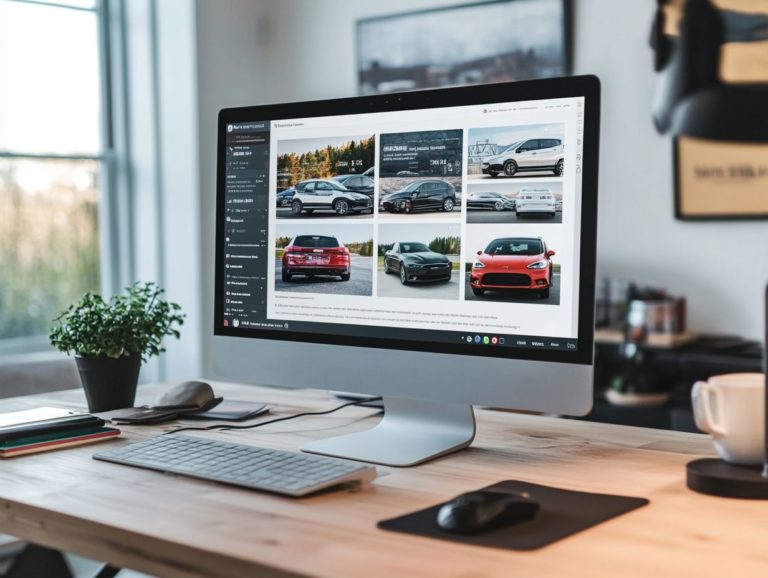Negotiation Tips for Used Car Buyers
Getting ready to negotiate for a used car can be exciting! Here s how to do it right.
This guide outlines essential steps, starting with researching the market and pinpointing the ideal vehicle for your needs, all the way to building rapport with the seller.
You will discover effective negotiation tactics, how to navigate the final closing process, and tips for successful communication along the way.
Whether you re a seasoned buyer or embarking on this journey for the first time, these insights will empower you to secure the best possible price.
Contents
- Key Takeaways:
- Preparing for Negotiations
- Building Rapport with the Seller
- Smart Negotiation Strategies
- Finalizing the Deal
- Tips for a Successful Negotiation
- Frequently Asked Questions
- What are some negotiation tips for used car buyers?
- Should I always start with a lower offer when negotiating?
- How can I use the car’s condition to negotiate a better price?
- What should I do if the seller is not willing to negotiate?
- Is it necessary to have a mechanic inspect the car before negotiating?
- What should I do if I’m not comfortable with the negotiation process?
Key Takeaways:
- Do your market research and set a budget.
- Build rapport with the seller by finding common ground.
- Communicate effectively while being firm yet flexible.

Preparing for Negotiations
Preparing for negotiations in the used car market requires a strategic mindset. Start with thorough online research to understand prices and options, and consider following tips for negotiating in person when buying used.
Make sure to review how cars lose value over time and establish a clear budget based on the vehicle s original price and current market value. It s also wise to explore manufacturer warranties.
Be aware of potential issues that can come with purchasing a used vehicle. With this knowledge, you’ll be ready to leverage the top car negotiation tactics for buyers and get the best deal!
Researching the Market and Setting a Budget
Researching the market is key to establishing a realistic budget when you’re in the market for a used car. It helps you understand average listing prices and current car loan rates.
In your quest for the best deal, compare prices from various sources, including private party sales and dealership offerings. This helps you see what a fair price is.
Using websites and apps that aggregate listings can provide a comprehensive overview, making it easier to spot discrepancies and discover potential savings. Don t overlook the importance of obtaining a vehicle history report; it’s essential for revealing crucial information like previous accidents or title issues.
When you couple this with a thorough vehicle inspection, you’re enabled to make informed and prudent financial decisions, ensuring that your investment is sound and aligned with your budgetary goals.
Identifying the Right Car for Your Needs
Identifying the right car for your needs means considering a range of factors. Do you lean towards a certified pre-owned vehicle, an SUV, or perhaps a compact car? Understanding how trade-in value plays into your purchase is also crucial.
Elements like your lifestyle, budget, and personal preferences significantly shape your decision-making process. For example, if you’re part of a family, you might prioritize spaciousness and safety features. If you’re commuting daily, fuel efficiency and reliability may top your list.
To effectively narrow down your options, conducting thorough research is essential. Utilize resources such as online reviews, expert ratings, and comparison tools to inform your choices.
When it comes time to finalize your purchase, don’t hesitate to negotiate. Knowing the fair market value of your desired vehicle and remaining confident in your budget can greatly enhance your chances of securing a deal that aligns perfectly with your financial situation and needs. To better prepare, consider learning about what to expect in a car negotiation.
Building Rapport with the Seller
Building rapport with the seller is essential during the negotiation process. By finding common ground, you enhance your negotiating power, which can ultimately lead to securing a better deal on your desired vehicle. For more strategies, check out these tips for negotiating with online dealers.
Building Trust

Establishing trust with the seller boosts your negotiating power and creates a better atmosphere for discussing the price and condition of the vehicle. Learning winning techniques for online car negotiation can further enhance this process.
When both parties feel secure, negotiations become collaborative. Sharing your budget openly shows you are ready to engage honestly, which builds respect.
This transparent approach can ease any anxieties the seller might have. It encourages them to disclose more about the vehicle, including its true condition and any potential issues.
Psychologically, trust influences the seller to make concessions, as they begin to see you not merely as a buyer but as a partner in this transaction.
Smart Negotiation Strategies
Effective strategies are key for a successful car purchase.
Start with a reasonable offer to set a positive tone for discussions. To enhance your bargaining power, consider exploring best practices for car negotiation and use what you know about the vehicle to strengthen your position.
Making a Fair Offer
Start with a fair offer based on the vehicle’s market value.
Use resources like Kelley Blue Book or Edmunds to gauge average prices for similar models in your area, considering year, mileage, and condition.
This thorough research equips you with vital information and fosters a transparent dialogue.
When you demonstrate a solid understanding of the vehicle s market value, you create a respectful negotiation environment.
Using Knowledge Wisely
Know the vehicle s history to inform your negotiation tactics.
A vehicle history report reveals past incidents, repairs, and maintenance, flagging potential issues.
Being attuned to current market trends helps you identify fair pricing based on the car’s condition.
This knowledge boosts your leverage during negotiations, allowing you to confidently present your case.
Finalizing the Deal
Closing the deal means finalizing price and terms for a smooth transaction.
Consider factors like warranty and payment options carefully.
Nailing Down Price and Terms

Finalizing your agreement requires careful attention to the vehicle’s condition.
Bring up any minor repairs needed or issues from previous inspections to ensure transparency.
By prioritizing clarity in your communication, you can work toward a mutual understanding that reflects the vehicle s true value.
Ensuring a Smooth Transaction
Ensuring a seamless transaction demands careful planning about how you want to pay, particularly an awareness of current car loan rates that can significantly sway your financing choices.
To navigate this process with finesse, it s essential to explore various payment methods at your disposal such as cash, financing, or trade-ins. Each option offers unique benefits tailored to your specific situation.
If financing is on your radar, reviewing pre-approval for a loan can streamline your experience. Cash payments can expedite the process. If you choose to trade in your vehicle, preparing it by cleaning and gathering necessary documentation can enhance its value.
On transaction day, having all the required paperwork organized and easily accessible will help minimize any potential delays. Establishing a realistic timeline for the day can keep everything running smoothly and alleviate any stress you might encounter.
Tips for a Successful Negotiation
Successful negotiation hinges on your ability to communicate effectively and hone your listening skills. This enables you to articulate your needs clearly while also adapting your approach.
The key is to maintain a balance: be firm in your stance but flexible enough to navigate the nuances of the discussion.
Effective Communication and Listening Skills
Effective communication and listening skills are crucial for cultivating positive interactions between buyers and sellers, ensuring that both parties grasp each other’s needs and expectations.
Maintaining eye contact is essential; it exudes confidence and signals genuine investment in what the other party has to convey.
Summarizing key points throughout the negotiation helps clear up misunderstandings and confirms that everyone is aligned.
Asking open-ended questions can further foster dialogue, offering deeper insights into the motivations and concerns of both sides.
When you employ these techniques, the chances of reaching a mutually beneficial agreement soar, setting the stage for more successful negotiations.
Being Firm but Flexible
Being firm yet flexible is a crucial strategy in negotiations, enabling you to stand your ground while remaining open to alternative solutions offered by the seller. This approach cultivates a balanced atmosphere where both you and the other party feel heard and valued.
Take property negotiations, for example. You might firmly insist on a specific price to signal your commitment to your budget. However, by being receptive to the seller’s proposed terms such as closing dates or included amenities you open the door to potential compromises.
In these situations, maintaining your core needs while embracing flexibility can lead to unexpected solutions that benefit both sides. Ultimately, this adaptability not only enhances your negotiation outcomes but also fosters a more collaborative relationship for the future.
Frequently Asked Questions

What are some negotiation tips for used car buyers?
1. Research the market value: Before starting negotiations, research the make, model, and year of the car you want to buy to understand its market value. Familiarizing yourself with tips for a successful car inspection negotiation will help you negotiate a fair price.
Should I always start with a lower offer when negotiating?
2. Yes, it’s generally a good idea to start with a lower offer. This gives you room to negotiate and can potentially save you money. However, make sure your offer is realistic and based on the market value.
How can I use the car’s condition to negotiate a better price?
3. Take note of any imperfections or maintenance needs of the car and use these as leverage during negotiations. Understanding the art of negotiating car prices can help you ask for a lower price or request the seller to make necessary repairs before finalizing the deal.
What should I do if the seller is not willing to negotiate?
4. If the seller is firm on their price and not willing to negotiate, you can try to negotiate on other aspects, such as including additional accessories or asking for a warranty. You can also consider what to say when negotiating car prices. Don’t hesitate to walk away if the deal doesn’t meet your needs.
Is it necessary to have a mechanic inspect the car before negotiating?
5. It’s highly recommended to have a mechanic inspect the car before purchasing it. This can help you identify any potential issues and negotiate a lower price. If the seller is not open to a mechanic’s inspection, it can be a red flag, and you may want to reconsider the purchase.
Now that you know these tips, get out there and find the perfect car deal!
What should I do if I’m not comfortable with the negotiation process?
Feeling uneasy about negotiating? You’re not alone! Consider bringing a friend or family member with car-buying experience, and don’t forget to check out the do’s and don’ts of used car buying for additional guidance.
They can help you negotiate and make sure you get a fair deal. Hiring a professional car buyer is another option.






